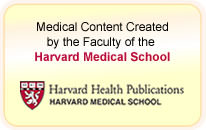
Conditions in Depth
This page contains the basic information about Gastroesophageal Reflux Disease (GERD) .
Return to the Gastroesophageal Reflux Disease (GERD) Main Condition Center
Treatment
Treatment for most people with GERD includes lifestyle changes as described above and medication. If symptoms persist, surgery or endoscopy treatments are other options.
Medications
There are several medications that can be used to treat GERD. They include:
-
Over-the-counter acid buffers — Buffers neutralize acid. They include Mylanta, Maalox, Tums, Rolaids, and Gaviscon. The liquid forms of these medications work faster But the tablets may be more convenient.
Antacids that contain magnesium can cause diarrhea. And antacids that contain aluminum can cause constipation. Your doctor may advise you to alternate antacids to avoid these problems. These medicines work for a short time and they do not heal the inflammation of the esophagus.
-
Over-the-counter H2 blockers — These drugs cause the stomach to make less acid. They are effective in patients with mild to moderate symptoms. They include famotidine (Pepcid AC), cimetidine (Tagamet HB) and ranitidine (Zantac 75).
-
Over-the-counter proton pump inhibitors — Proton pump inhibitors shut off the stomach's acid production.
Proton pump inhibitors are very effective. They can be especially helpful in patients who do not respond to H2 blockers and antacids. These drugs are more potent acid-blockers than are H2 blockers, but they take longer to begin their effect.
Proton pump inhibitors should not be combined with an H2 blocker. The H2 blocker can prevent the proton pump inhibitor from working.
-
Prescription medications — Prescription medications include:
-
H2 blockers — These are prescribed at higher doses than those available in over-the-counter forms.
-
Proton pump inhibitors — A variety of proton pump inhibitors are available by prescription.
-
Motility drugs — These medications may help to decrease esophageal reflux. But they are not usually used as the only treatment for GERD. They help the stomach to empty faster, which decreases the amount of time during which reflux can occur.
-
Mucosal protectors — These medications coat, soothe and protect the irritated esophageal lining. One example is sucralfate (Carafate).
-
Surgery
Surgery is an option for people with severe, difficult-to-control GERD symptoms. It may also be considered for people who have complications such as asthma or pneumonia, or scar tissue in the esophagus. Some people who do not want to take medications for a long time may choose surgery.
Surgery for GERD can be done using camera-guided instruments. This technique is called laparoscopic surgery. Laparoscopic surgery requires smaller incisions than conventional surgery.
In a procedure called Nissen fundoplication, excess stomach tissue is folded around the esophagus and sewn in place. This holds extra pressure around the weakened esophageal sphincter.
This operation appears to relieve symptoms about as much as prescription acid-blocking medicines. The success rates of surgery might be lower for people whose symptoms are not relieved by anti-acid medicines. Following surgery, some people have a lasting bothersome side effect. But most people who undergo surgery are very satisfied with the results.
Potential side effects include swallowing difficulty, diarrhea and the inability to belch or vomit to relieve bloating or nausea.
Endoscopy treatments
Three new treatments have been developed to tighten the lower esophageal sphincter using an endoscope. The three treatments are:
-
Stitching (plication)
-
Heating (the Stretta procedure)
-
Injection of the sphincter with a bulking material (the Enteryx procedure)
All three endoscopic treatments were developed recently. Their long-term success rates are unknown. And little is known about their potential complications.
From Health A-Z, Harvard Health Publications. Copyright 2006 by the President and Fellows of Harvard College. All rights reserved. Written permission is required to reproduce, in any manner, in whole or in part, the material contained herein. To make a reprint request, contact Harvard Health Publications. Used with permission of StayWell.